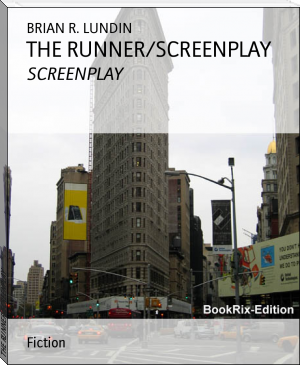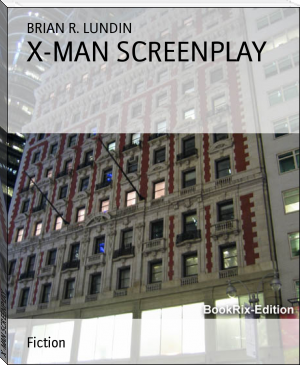THE RUNNER/SCREENPLAY, BRIAN R. LUNDIN [best classic books to read .txt] 📗

- Author: BRIAN R. LUNDIN
Book online «THE RUNNER/SCREENPLAY, BRIAN R. LUNDIN [best classic books to read .txt] 📗». Author BRIAN R. LUNDIN
straight up at the dark sky. Vito left out a weak whimper as he got to his feet; limping, staggering, falling and rising he began running crazily along the creek bed with the speed of desperation. He heard the sounds of feet running rapidly down the hill, deep growls and branches breaking as thick four-footed bodies raced toward him.
Vito started to cry as he scuffled aimlessly along the creek bed, stumbling and falling. He had to get away he pushed through a tangle of wet vines. Up beyond the canopy of dead branches and pine cones he caught sight of a few brightly lit stars and when he turned a bend in the creek bed he stopped suddenly when he saw the beautiful nude woman, a dark wind was blowing through her long black hair. “Who are you,” he yelled.
Again, the woman smiled at him and turned into a wolf, Vito began to run again he tripped over an old tree stump years dead and fell. He tried to get up, but couldn’t and felt a terrible pain in his left leg. When he looked down he saw the bone sticking out from his flesh and blood starting to pool. In the darkness, Vito saw the woman again and then she vanished before his eyes. Vito lay on the cold wet ground his leg was pulsing and blood spouted from the wound. Vito’s eyes now totally adjusted to the dark, looked around and saw the yellowish eyes in the shadows, he screamed as the pack slowly approached.
Jerome McLemore, the Capi di Tutti Capi in Chicago sat at the head of a round, highly polished mahogany table Ted Bunche his Bastone was seated to his right. Madame Bourneis and Marque stood behind Jerome. On one side of the table sat Tony Marotti. Tony was fortyish, slender but powerfully built. He had thick black hair brushed back to cover the top of half of his ears. His face was angular and had intelligent brown eyes. He looked like an undertaker in his shiny black silk suit, white shirt and thin black tie. He spoke in a low doleful voice with a thick Brooklyn accent. Joey Callibrese looked older than Tony and was a lean and scrawny man with sharp angular facial features and a hideous knife scar across his nose. He walked with a limp; a bullet from a lupara had shattered his leg when he was a young Picciotto. His mingle grey and white hair was cut short and he wore a conservative dark blue suit and a white shirt buttoned at the collar. Johnny Tattalagia looked to be about thirty and had all the typical Italian facial features; a long, straight nose, wavy black hair and deep brown eyes. Johnny was a big man in a black knit, short-sleeved shirt that both revealed and accentuated his muscular arms. His thick eyebrows gave him the look of a mean-spirited truck driver; the image intended by the Commission, Jerome was sure. On the other side of the table were the members of Jerome’s policy syndicate; Jimmy Irving and Kid Riviera, owners of the Windy City, Beach and Sun policy wheel, the second largest wheel in the city; Howard Louis owner of the Honey, Babe and Twin, Clint Black, owner of the Mississippi, Texas and Tennessee, Floyd Johnson owner of the Ohio, Maryland and Illinois and Cubbie Cole, owner of the Nickel, Dime and Quarter, and Pops and Cinque, representing the State Street Boys. Jerome addressed the group.
JEROME
Firstly I wish to welcome Tony, Joey and Johnny to Chicago who come highly recommended by our friends and colleagues in New York. Primarily their job will be to ensure that the Italian section of our organization respect my position and adhere to my decisions. The purpose of this sit-down is first to introduce you, the board of directors for the new Chicago Organization to each other. Note, I said organization not “Outfit.” The days of street shootouts and random killings are over. We will operate like a legitimate corporation with rules and regulations and it is your job to ensure that your employees abide by the decisions we make.
Jerome McLemore the Capi di Tutti Capi ran the new Chicago Organization successful ruled until the late 1970 when the State decided to become the new Policy Kings and started the State Lottery. Jerome and his son Christopher, Ted, Madame Bourneis and Marque left Chicago and were never heard from again.
EPILOGUE
The death of policy was not the lottery or the attempts by the Chicago Outfit to take it over, policy died because the older people that supported the game died. The younger generation preferred losing their money at the riverboats or land-based casino that offered variety of games; blackjack, poker, dice, roulette wheels and other games. In addition they also offered glitter and glist found only in these state supported “Stations.” These gambling venues offered free drinks and cigarettes, cheap dinners and attractive waitresses and waiters. Off-track horse racing parlors were also attractive to the young gamblers who would relax in plush leather chairs and watch horse races anywhere in the country on wide-screen color television and drinking free whiskey. State supported lotteries have a long history as a source of government revenue and was often used to raise money for public purposes in colonial times. Early Harvard and Yale universities were funded in part with lottery proceeds. The Continental Congress even approved a lottery to help finance the American Revolution, but the lottery failed. In 1964, the New Hampshire legislature authorized a twice-a- year sweepstakes on horse race results, with the proceeds dedicated to public education. In 1974, the Illinois State Lottery was authorized as a source of government revenue and has generated sales over $7.6 billion and has paid $3.7 billion in prize money. In Illinois, lottery machines are as common as policy stations were. Bets can be made in restaurants, retail stores, gas stations and anywhere else a machine can be installed. The Illinois State lottery has improved on Jerome McLemore’s innovative ways of placing a bet. In 1980, the lottery began accepting bets on three numbers,” gigs,” and by 2002 they have implemented many ways to a bettor can place a wager; the daily 4, the lucky 5, the little lotto which consist of 6 numbers, the lottery 7. The winning numbers are drawn and televised twice a day, the mid-day and the evening drawings. The odds on winning any of the prizes on these games are greater than on policy gambling, where usually the odds were 1:600, in these state lottery games the odds are more like 1:10 million. The Mega Million Game where the prizes are in the millions and involve many states the odds of winning is astronomical. The Power Ball, where the object of the game is to chose 5 numbers from 1 to 49, and then the “Powerball, number from 1 to 42. The odds of winning are 1:80 million. In addition there are the instant games, where the bettor receives a scratch card that contains winning numbers; again the odds are heavily against the bettor. However, unlike the Policy Kings who made fortunes off their nickel and dime game, but provided jobs to residents of the black community and spent the money in the black community, the state lottery and the off-track betting parlors generally diverted the money from the black community into a general fund very little ever going into bettering the lives of the blacks who lost thousands of dollars on the game.
END
Imprint
Vito started to cry as he scuffled aimlessly along the creek bed, stumbling and falling. He had to get away he pushed through a tangle of wet vines. Up beyond the canopy of dead branches and pine cones he caught sight of a few brightly lit stars and when he turned a bend in the creek bed he stopped suddenly when he saw the beautiful nude woman, a dark wind was blowing through her long black hair. “Who are you,” he yelled.
Again, the woman smiled at him and turned into a wolf, Vito began to run again he tripped over an old tree stump years dead and fell. He tried to get up, but couldn’t and felt a terrible pain in his left leg. When he looked down he saw the bone sticking out from his flesh and blood starting to pool. In the darkness, Vito saw the woman again and then she vanished before his eyes. Vito lay on the cold wet ground his leg was pulsing and blood spouted from the wound. Vito’s eyes now totally adjusted to the dark, looked around and saw the yellowish eyes in the shadows, he screamed as the pack slowly approached.
Jerome McLemore, the Capi di Tutti Capi in Chicago sat at the head of a round, highly polished mahogany table Ted Bunche his Bastone was seated to his right. Madame Bourneis and Marque stood behind Jerome. On one side of the table sat Tony Marotti. Tony was fortyish, slender but powerfully built. He had thick black hair brushed back to cover the top of half of his ears. His face was angular and had intelligent brown eyes. He looked like an undertaker in his shiny black silk suit, white shirt and thin black tie. He spoke in a low doleful voice with a thick Brooklyn accent. Joey Callibrese looked older than Tony and was a lean and scrawny man with sharp angular facial features and a hideous knife scar across his nose. He walked with a limp; a bullet from a lupara had shattered his leg when he was a young Picciotto. His mingle grey and white hair was cut short and he wore a conservative dark blue suit and a white shirt buttoned at the collar. Johnny Tattalagia looked to be about thirty and had all the typical Italian facial features; a long, straight nose, wavy black hair and deep brown eyes. Johnny was a big man in a black knit, short-sleeved shirt that both revealed and accentuated his muscular arms. His thick eyebrows gave him the look of a mean-spirited truck driver; the image intended by the Commission, Jerome was sure. On the other side of the table were the members of Jerome’s policy syndicate; Jimmy Irving and Kid Riviera, owners of the Windy City, Beach and Sun policy wheel, the second largest wheel in the city; Howard Louis owner of the Honey, Babe and Twin, Clint Black, owner of the Mississippi, Texas and Tennessee, Floyd Johnson owner of the Ohio, Maryland and Illinois and Cubbie Cole, owner of the Nickel, Dime and Quarter, and Pops and Cinque, representing the State Street Boys. Jerome addressed the group.
JEROME
Firstly I wish to welcome Tony, Joey and Johnny to Chicago who come highly recommended by our friends and colleagues in New York. Primarily their job will be to ensure that the Italian section of our organization respect my position and adhere to my decisions. The purpose of this sit-down is first to introduce you, the board of directors for the new Chicago Organization to each other. Note, I said organization not “Outfit.” The days of street shootouts and random killings are over. We will operate like a legitimate corporation with rules and regulations and it is your job to ensure that your employees abide by the decisions we make.
Jerome McLemore the Capi di Tutti Capi ran the new Chicago Organization successful ruled until the late 1970 when the State decided to become the new Policy Kings and started the State Lottery. Jerome and his son Christopher, Ted, Madame Bourneis and Marque left Chicago and were never heard from again.
EPILOGUE
The death of policy was not the lottery or the attempts by the Chicago Outfit to take it over, policy died because the older people that supported the game died. The younger generation preferred losing their money at the riverboats or land-based casino that offered variety of games; blackjack, poker, dice, roulette wheels and other games. In addition they also offered glitter and glist found only in these state supported “Stations.” These gambling venues offered free drinks and cigarettes, cheap dinners and attractive waitresses and waiters. Off-track horse racing parlors were also attractive to the young gamblers who would relax in plush leather chairs and watch horse races anywhere in the country on wide-screen color television and drinking free whiskey. State supported lotteries have a long history as a source of government revenue and was often used to raise money for public purposes in colonial times. Early Harvard and Yale universities were funded in part with lottery proceeds. The Continental Congress even approved a lottery to help finance the American Revolution, but the lottery failed. In 1964, the New Hampshire legislature authorized a twice-a- year sweepstakes on horse race results, with the proceeds dedicated to public education. In 1974, the Illinois State Lottery was authorized as a source of government revenue and has generated sales over $7.6 billion and has paid $3.7 billion in prize money. In Illinois, lottery machines are as common as policy stations were. Bets can be made in restaurants, retail stores, gas stations and anywhere else a machine can be installed. The Illinois State lottery has improved on Jerome McLemore’s innovative ways of placing a bet. In 1980, the lottery began accepting bets on three numbers,” gigs,” and by 2002 they have implemented many ways to a bettor can place a wager; the daily 4, the lucky 5, the little lotto which consist of 6 numbers, the lottery 7. The winning numbers are drawn and televised twice a day, the mid-day and the evening drawings. The odds on winning any of the prizes on these games are greater than on policy gambling, where usually the odds were 1:600, in these state lottery games the odds are more like 1:10 million. The Mega Million Game where the prizes are in the millions and involve many states the odds of winning is astronomical. The Power Ball, where the object of the game is to chose 5 numbers from 1 to 49, and then the “Powerball, number from 1 to 42. The odds of winning are 1:80 million. In addition there are the instant games, where the bettor receives a scratch card that contains winning numbers; again the odds are heavily against the bettor. However, unlike the Policy Kings who made fortunes off their nickel and dime game, but provided jobs to residents of the black community and spent the money in the black community, the state lottery and the off-track betting parlors generally diverted the money from the black community into a general fund very little ever going into bettering the lives of the blacks who lost thousands of dollars on the game.
END
Imprint
Publication Date: 05-25-2012
All Rights Reserved
Free e-book «THE RUNNER/SCREENPLAY, BRIAN R. LUNDIN [best classic books to read .txt] 📗» - read online now
Similar e-books:





Comments (0)